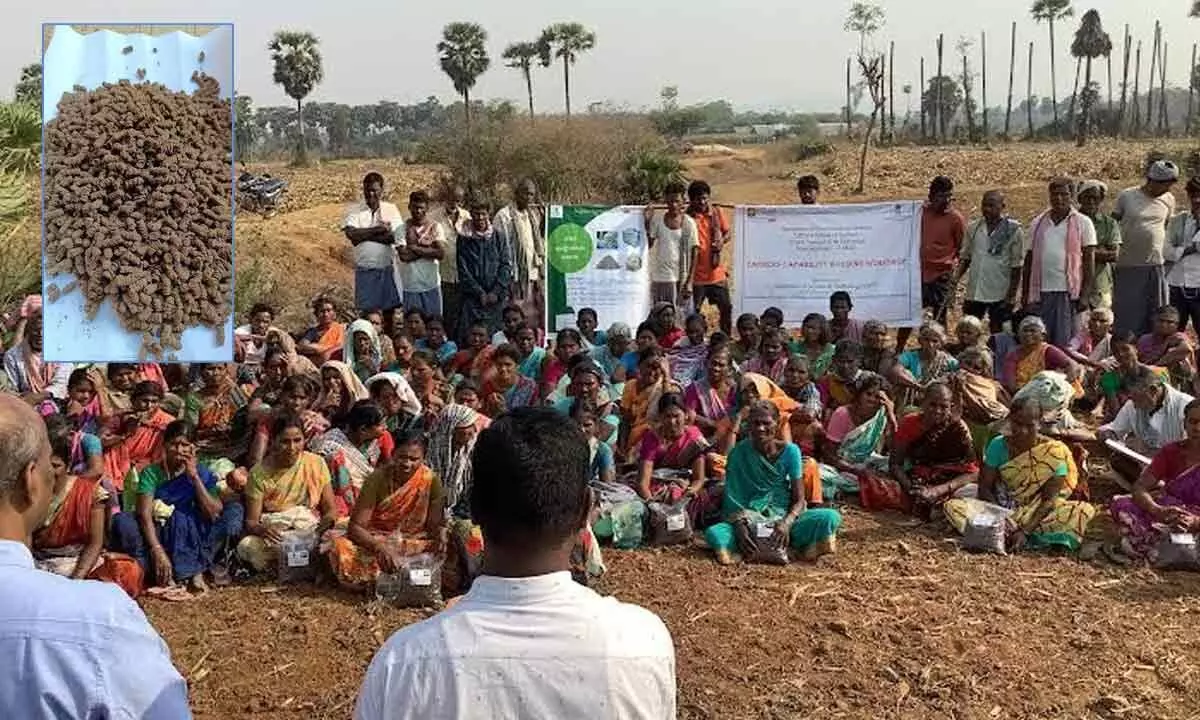Live
- Nagarkurnool: Burglary in a locked house
- Nadda asks voters to unseat BJD govt
- KCR Rally at Hanumakonda Chowrastha Road Show for Warangal Parliamentary Elections
- Yastika, Renuka Thakur star in India’s 44-run win over Bangladesh in T20I series opener
- Sai Sangeeta won gold medal for India in Dubai Asian Championship
- BSP's Akash Anand booked for hate speech against BJP
- Two die of sunstroke in Kerala, heat alert sounded in parts of state
- IPL 2024: Will Jacks, Kohli shock Gujarat, keep RCB's playoff hopes alive
- IPL 2024: 'Can't sit and speak from a box', Virat Kohli slams strike-rate critics
- ISL 2023-24: We have to give our everything, says FC Goa's Fernandes ahead of semis clash with Mumbai City
Just In
Visakhapatnam: Empowering farmers through organic compost pelletisation


Farmers taking part in an awareness drive facilitated on organic compost pelletisation by GITAM
- Overuse of synthetic fertilisers has a negative influence on soil quality and leads to soil degradation
- Currently, over 67 million tonne food in the food industry is wasted every year in India
- Pelletisation method will help increase marketability because of the long shelf life
Visakhapatnam: In a move to reap benefits of sustainable agricultural practices and help farmers get desirable yields, GITAM Deemed to be University has embarked on converting food waste into compost pellets and encouraging farming communities to replace synthetic fertilisers with organic ones.
Supported by Science for Equity Empowerment and Development (SEED) under the Department of Science and Technology, the agenda aims at maximising the process of converting food waste into compost pelletisation, educating farmers to stick to indigenous practices, conserving soil health and enhancing crop diversity involving farmers' associations.
Following increasing global concerns over fertiliser security, the collaborative venture intends to empower farming communities with a massive awareness drive and show them ways to adopt high yield, low cultivation cost strategies by converting food waste into home-grown compost pelletisation.
After reaching out to the farmers in Srikakulam, Vizianagaram and parts of Visakhapatnam through its intense campaigning on preparing the compost pellets incorporating scientific methods, the institution intends to give hands-on training to select farmers next.
After getting hands-on training in producing pellets, the trained farmers will in turn educate the communities on the subject. "Currently, leftover food from the hostel is used for making organic pellets as they are dense in protein, lipids, carbs, macro and microelements required for natural fertiliser. The collected leftover food is processed in a digestion machine which aids in converting into compost within 24 hours," explains N Srinivas, who is leading the project as principal investigator along with Ch. Ramakrishna and K Suresh Kumar from Department of Environmental Science, GITAM.
Given the huge quantities of food waste in urban centres, the project intends to generate wealth from waste, make organic farming affordable for farmers through ample generation of compost pellets and encourage the communities to be less dependent on synthetic fertilisers.
"A large chunk of farming communities came forward to adopt indigenous practices to produce organic pellets. Although the technology transfer is being taken care of, farmers do require a centre to apply the knowledge learnt into a viable project by setting up a pelletiser unit," elaborates Prof. Srinivas.
Since compost pellets have a longer shelf life, farmers prefer such organic fertilisers over synthetic ones. By converting food waste collected from hostels, temples, hotels and other urban centres, the institution plans to take the endeavour way forward, catering to a larger section of farming communities.

© 2024 Hyderabad Media House Limited/The Hans India. All rights reserved. Powered by hocalwire.com






